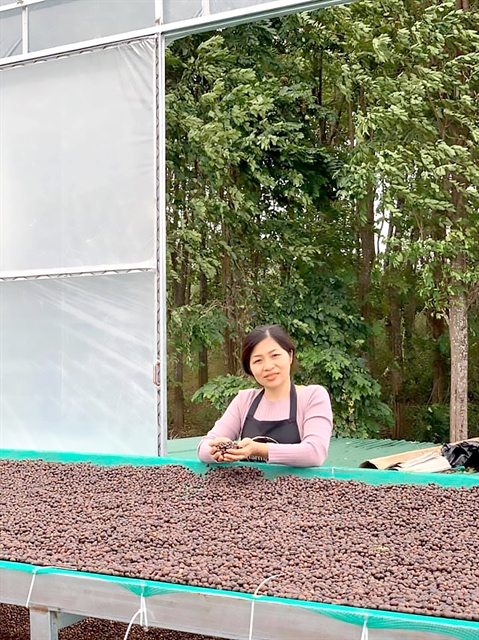_med.jpg) Economy
Economy

 |
| Director Anh holding a handful of FarmFood coffees. — Photo courtesy of FarmFood |
Lê Việt Dũng
HÀ NỘi — The pandemic was not a great equaliser in Việt Nam. Its impact has been disproportionately harsh on women's careers, with a VCCI survey showing women-owned enterprises were more hard hit than men-owned financially.
At its peak, nearly 40 per cent of female entrepreneurs failed to keep their businesses afloat.
But there's another fact that has come to light recently: Vietnamese women have never been less active than those from other countries in entrepreneurship. They are breaking through barriers and making their mark in the post-pandemic business world.
As the VCCI data has been tallied, Vietnamese women now take the helm of 22 per cent of all enterprises in Việt Nam, a level comparable to that in developed countries, such as Sweden (20 per cent), Singapore (24 per cent), and France (24 per cent). They also represented one-fourth of the outstanding entrepreneurs honoured by VCCI in 2022.
Such a big shift did not come from thin air, but was the result of the government's sustained efforts to support gender equality in the business sector, of which the Scheme to Support Women-led Startups between 2017 to 2025 lies at the heart.
Hà Thị Nga, President of the Vietnam Women's Union, said the scheme in six years had brought 80,000 entrepreneurial ideas into life, with over 70,000 women getting the support to launch their own businesses. About 5,000 women-led cooperatives have been founded under its wing and 60,000 newly-established enterprises have been assisted in capability-building.
Its most remarkable contribution to female entrepreneurship was the establishment of the annual Women Entrepreneurship Competition, in which 2,024 projects were shortlisted for the final round in 2023. The special prize went to Hoàng Thị Thùy Linh, who managed to use advanced technology to produce organic milk from husked rice. The next 32 best projects were awarded three first prizes, four second prizes, six third prizes, and 19 consolation prizes.
First prize winner Bùi Thị Kim Anh, Director of FarmFood CO LTD, told Việt Nam News that she had left a managerial position in a bank to start her own business. Her vision was clear: to create jobs for local women and bring Vietnamese agricultural products to global markets.
She said the first stages in her entrepreneurial journey were not easy because her business began with little initial outlay. However, years of dedication and hard work had paid off as FarmFood had grown quickly in size and carved out a niche in international markets.
She said it is difficult to balance work and family life as a female entrepreneur. However, her supportive spouse had made it work by pitching in at home and taking charge of child care. He also supported her in R&D, and together they created many new high-quality products that had gained ground commercially.
She underlined the role of the scheme in female entrepreneurship, which had served as a bridge to help her close the gap between ideas and a thriving business. She urged the government to grant more financial assistance to the scheme "to create a more conducive business environment for women".
At the award ceremony, Prime Minister Phạm Minh Chính said the government had always put women entrepreneurship high on its agenda. Its National Gender Equality Strategy was guided by a clear vision: raising women-led entities to at least 27 per cent of all enterprises and cooperatives in 2025 and 30 per cent in 2030.
The targets are within reach, but it would require a collective effort of all public agencies across the spectrum to put Việt Nam at the forefront of feminine entrepreneurship. To that end, the PM called for measures to improve women's access to bank loans and startup funds to ensure "they have sufficient finance to bring their ideas into fruition". He also called for a pool of experienced specialists to provide guidance, share insights, and offer solutions to the challenges facing female entrepreneurs.
"More and more Vietnamese women will overcome their adversaries and make a name for themselves as successful entrepreneurs in Việt Nam and in the world," said Chính.
According to the White Book on Women-owned Small and Medium Enterprises in Việt Nam in April, Việt Nam was among the countries with the largest ratio of women-led enterprises in Southeast Asia. However, 90 per cent of the enterprises were micro and small, indicating that the government still has a long way to go to break the deep-running stereotype that impede women's efforts to pursue a full-time career in business. — VNS




